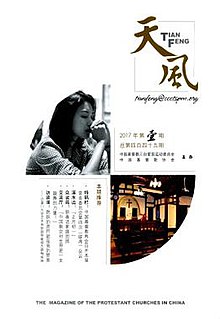
In China, house churches or family churches are Protestant assemblies in the People's Republic of China that operate independently from the state-sanctioned Three-Self Patriotic Movement (TSPM) and China Christian Council (CCC). They represent a tradition of independent churches that would not come under the control of the Chinese Communist Party dating back to Wang Ming-Dao in the 1950s. However, they came into their current form of existence after the Cultural Revolution in the early-1980s.
The Three-Self Patriotic Movement is the official government supervisory organ for Protestantism in the People's Republic of China. It is colloquially known as the Three-Self Church.
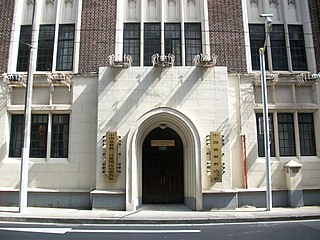
The China Christian Council was founded in 1980 as an umbrella organization for all Protestant churches in the People's Republic of China with Bishop K. H. Ting as its president. It works to provide theological education and the publication of Bibles, hymnals, and other religious literature. It encourages the exchange of information among local churches in evangelism, pastoral work and administration. It has formulated a church order for local churches, and seeks to continue to develop friendly relations with churches overseas.
K. H. Ting, Ting Kuang-hsun or Ding Guangxun, was Chairperson emeritus of the Three-Self Patriotic Movement (TSPM) and President emeritus of the China Christian Council, the government-approved Protestant church in China.

Christianity has been present in China since the early medieval period, and became a significant presence in the country during the early modern era. The Assyrian Church of the East appeared in China in the 7th century, during the Tang dynasty. Catholicism was one of the religions patronized by the emperors of the Mongol-led Yuan dynasty, but it did not take root in China until its reintroduction by the Jesuits during the 16th century. Beginning in the early 19th century, Protestant missions in China attracted small but influential followings, and independent Chinese churches were also established.

Y. T. Wu or Wu Yao-tsung was a Protestant leader in China who played a key role in the establishment of the Three-Self Patriotic Movement. Wu also played an important role in the theology of K. H. Ting.

Tzu-ch'en Chao, also known as T. C. Chao, was one of the leading Protestant theological thinkers in China in the early twentieth century.
The Shouters, or more properly the Shouters sect (呼喊派), is a label attached by the People's Republic of China (PRC) to an amorphous group within China that was targeted by the government first as counterrevolutionaries and subsequently as a criminal cult after incidents in Dongyang and Yiwu counties in Zhejiang province in February 1982. "The Shouters sect" became the object of waves of arrests in 1983 and again in 1995. Several 1983 publications with ties to the Three-Self Patriotic Movement (TSPM) accused the late expatriate Chinese Christian teacher Witness Lee of being the leader of "the Shouters sect" and of instigating the disorders. In practice, however, the appellation "the Shouters sect" has been applied far more broadly to many groups that pray openly and audibly and/or do not register or otherwise cooperate with the TSPM. There is considerable reason to doubt the veracity of the reports which led to the condemnation of "the Shouters sect" and the association of them with Witness Lee or the local churches, and the local churches distance themselves from the Shouters.
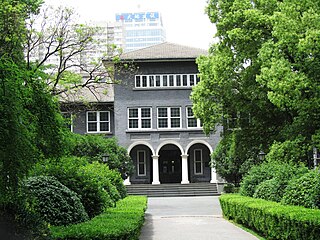
The Nanjing Union Theological Seminary is the flagship theological seminary of Protestant Christianity in China today. It is managed by the China Christian Council.
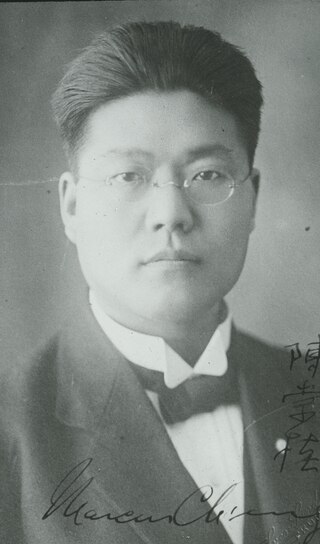
Marcus Cheng, was a leading Chinese Protestant evangelical leader. Cheng became a prominent evangelical leader and Chinese nationalist and gained international attention in the 1920s. After the establishment of the People's Republic of China in 1949, Cheng joined other Protestant leaders to form the Three-Self Patriotic Movement, which promised independence of foreign financing and control in return for religious autonomy. He became disillusioned and openly criticized the government's policies on religion in 1957. Although he was not arrested, he was severely criticized and died in obscurity in 1963.

Canaan Hymns or Songs of Canaan is a collection of Chinese hymns composed by Lü Xiaomin, beginning in 1990. Lü Xiaomin is a daughter of peasants of the Hui minority born in 1970, who converted to Christianity. Lü's theological background is in Pentecostalism and the local churches movement, and the hymns reflect themes of Christology, pneumatology and eschatology against the backdrop of Chinese political realities.
Political theology in China refers to the religious beliefs and principles that motivate the politics of China. For two millennia, China was organized on a Confucian understanding of religion and politics, often discussed in terms of Confucian political philosophy. At various points throughout its history, Chinese Buddhism presented an alternative to the political import of Confucianism. However, since the mid-twentieth century, communist understandings of religion have dominated the discourse.
The three-self formula or three-self principle is a missiological strategy to establish indigenous churches. Its principles are: self-governance, self-support, and self-propagation. It was first coined in the late-19th century by various missions theorists, and is still used today in certain contexts such as in the Three-Self Patriotic Movement in mainland China.
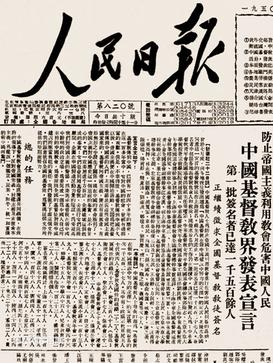
"Direction of Endeavor for Chinese Christianity in the Construction of New China", commonly known as "The Christian Manifesto" or "The Three-Self Manifesto", was a political manifesto of Protestants in China whereby they backed the newly founded People's Republic of China (PRC) and the leadership of the Chinese Communist Party (CCP). Published in 1950, the manifesto paved the way for the government-controlled Three-Self Patriotic Movement (TSPM) of Protestants. This movement proclaimed the three principles of self-government, self-support, and self-propagation. The drafting and content of the manifesto was, and remains, controversial to this day.
The National Christian Council of China (NCC) was a Protestant organization in China. Its members were both Chinese Protestant churches and foreign missionary societies and its purpose was to promote cooperation among these churches and societies. The NCC was formed in 1922 in the aftermath of the Edinburgh Missionary Conference.

Protestantism in China uses lianghui to speak of the two Chinese government-sanctioned Protestant organizations: the Three-Self Patriotic Movement (TSPM) and the China Christian Council (CCC). Due to the close relationship between these two organizations, they are sometimes mistaken as the same organization.
The Ecumenical China Study Liaison Group (ECSLG) is a group of mostly European China watchers who met intermittently in the 1970s and 1980s. Key members represented the Roman Catholic Church and mainline Protestant denominations, including state churches. Members gathered every one to two years to share research and consider developments in Christianity in China starting from the latter part of the Cultural Revolution through the death of Mao Zedong, the opening up of China under the Four Modernizations Policy of Deng Xiaoping, the reestablishment of the Three-Self Patriotic Movement, and the persecution of the so-called "Shouters sect" in 1983.
The Denunciation Movement started on April 19, 1951, as a movement to rid the Christian church in China from foreign influence by denouncing and expelling foreign missionaries. It quickly spread, however, to include the arrest and imprisonment of popular Chinese Christian leaders, particularly evangelicals.
Jia Yuming was a Chinese Christian theologian and biblical commentator. He worked at several seminaries and eventually became a vice-chairperson of the Communist Party-aligned Three-Self Patriotic Movement. He self-identified as a fundamentalist and taught that "perfect salvation", which in his definition entailed becoming a "Christ-human", was the ultimate goal of all Christians.
